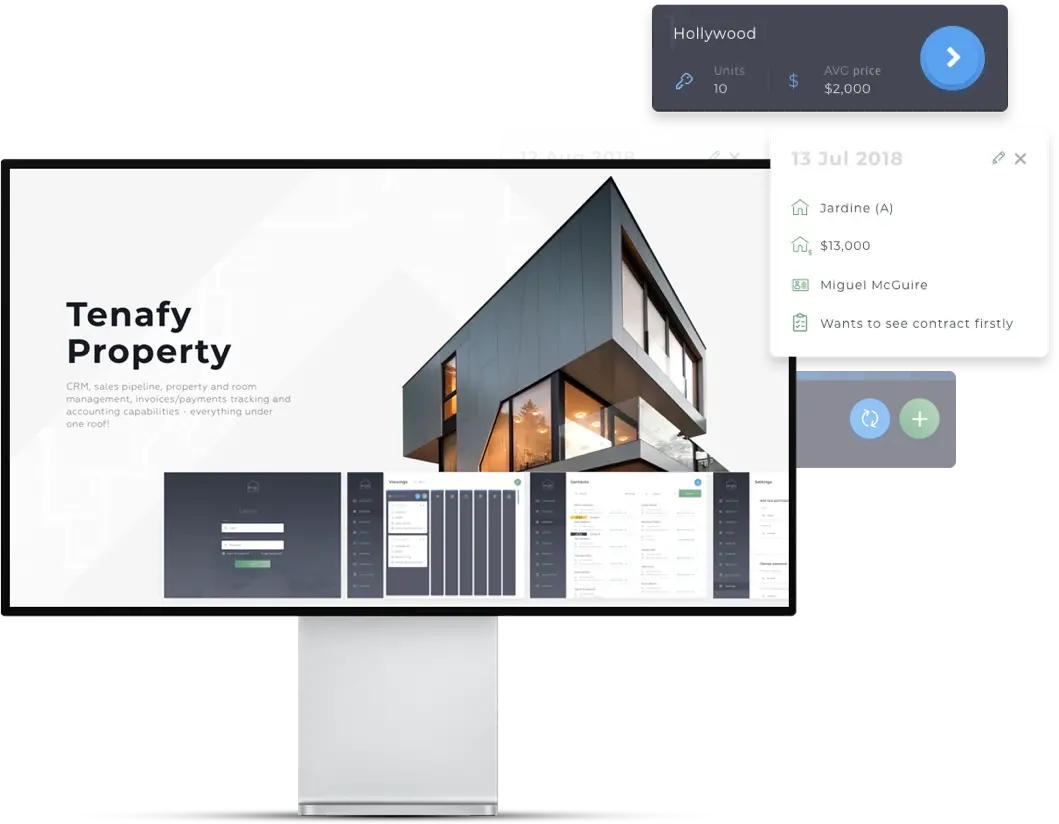The ever-growing market of real estate calls for an updated model of interaction between the providers in this niche. 75% of the time, people search for a new abode online. Most realty agents stay online to communicate with clients, while about 76% of all providers also employ FB and other social media to promote. This is good and all, but we need an all-in-one go-to solution with a centralized database.
Multi Listing Service systems (MLS) enable realtors to efficiently tackle complex tasks of centralization and workflow management in real time. In the long run, they streamline and reinforce client communication. Expanding operational capabilities via a real estate API is a particular benefit, which allows you to:
- Analyze statistics;
- Generate data and collect reports;
- Work through upload errors;
- Configure triggers, notifications, etc.;
- Communicate with clients directly from the CRM
And more where all that comes from. A total win-win situation for real estate agencies looking to step up their game. At Requestum, we know all the ins and outs of adopting such systems. Let’s take a more in-depth look at their powers, best cases, and underlying specifics.
Understanding APIs
API is an application programming interface that defines and bridges the exchange of data between applications. In simpler words, real estate APIs can be thought of as service contract that defines how specific applications interact with each other. Only in this case, is it possible to integrate data about objects and messages into the internal database of the application or CRM software.
Importance of APIs in real estate data sharing
The use of APIs saves tons of time and money on creating applications that must meet the requirements of various data providers and easily integrate with MLS. They help agencies become less dependent on pure human performance and reduce the burden on staff.
Ultimately, you get to cut staff response time. Clients can receive all the necessary information and make decisions without the necessary participation of agents. In turn, companies also get the opportunity to intricately manage the quality of their work, giving their clients:
- Instant access to up-to-date data;
- Control and management of an agent’s performance;
- The ability to objectively check prices
The above benefits allow you to bring the quality of services provided to a whole new level.
Thus, a dedicated MLS provides realtors with several benefits:
Centralized, real-time updated database
Any agent can communicate with colleagues and share regional updates as the information enters a universal database. It is processed at the end of offline communication sessions, which provides:
- Search for objects by parameters;
- Creation of statistical reports;
- The capture of individual customer requests;
- Support for inter-agency relationships
The ability to share information about inaccurately posted or controversial real estate
Data is collected about all possible issues that may arise. Particularly common in the industry are homeowners who are happy to demand a deposit but are in no hurry to sell the object.
Discover the benefits of custom real estate CRM development
Universal accessibility
You can use the system wherever there is Internet and from any device. All information is synchronized in real time.
Simple implementation
Real estate software development is usually expensive and technically complex. Instead of initiating a full-on development lifecycle, you can simply use the ready-made API while saving resources and speeding up the project launch at the same time.
Evaluating Real Estate APIs
The surest method of API choice is timely competitor analysis and usability testing. You should check how up-to-date and secure a particular solution is before deciding to integrate it.
The main criteria to guide you are as follows:
Coverage and accuracy
An API shouldn't be overly complex, but it should be wide-ranging and highly accurate to provide the best possible experience. Flexibility and complexity must be balanced, the names used must be self-documenting and logical, and the code must be readable.
Update frequency
Access to databases must be failproof, and communication between applications and the service must be continuous. That is why the more often the API is updated, the better.
The design should be consistent and not vary from method to method (parameter order, semantics). There should not be too many input parameters, and the return value should indicate the result of the method execution.
Documentation and support
The API documentation contains information about how developers should structure requests and responses. It should be written in plain language and contain use examples.
The best API documentation provides self-help, explaining concisely and precisely what is possible and what is not, and where to start. It answers questions about syntax and functionality. The more thorough it is, the more confidently the product is distributed, and the fewer calls to technical support occur.
Error messages should contain as much information as possible, and exceptions should be handled as close as possible to where they occurred.
Pricing
The price of integrating or renting an API must be reasonable. In any case, it must not exceed the quality laid down in the API.
Ease of use
Convenience should be your main selection priority. A truly convenient API grants a quick response, a minimum of bugs, and a resilient workflow in the system. An API should not allow multiple ways to achieve a goal, streamlining the integration.
Tenafy Case Study: Streamlining Property Management Digitally

Overview of Real Estate APIs
There are dozens of different real estate APIs. The main varieties are:
- Residential, which is used to find, buy, and sell housing;
- Commercial, mainly required for entrepreneurs;
- Global, including the widest range of offers and opportunities
There are no significant differences in terms of development between them. They just focus on slightly different sectors of the same industry.
Deep Dive into Selected Real Estate APIs
In our professional opinion, the following APIs can help boost the way you distribute services in the market in the best way possible.
Zillow
Zillow simplifies buying and selling, increases market transparency, and connects users with qualified professionals. The API has a large geographical coverage and a huge number of offerings. With its help, you can get an objective picture of the formation and dynamics of market prices.
One of the most useful aspects is the user-friendly interface and the variety of tools and resources. The main advantages here include:
- Effective analytics;
- Free access;
- User trust
The platform provides a huge amount of information, but the search area can be narrowed down by simply setting up filters. Another advantage is the ability to contact agents using the Premier Agent program.
Although the platform has many useful features, there are also some disadvantages to consider:
- Zillow's Zestimate is not always accurate;
- A huge amount of information can be overwhelming for users
Realtor
The Realtor.com API provides incredible features, both free and paid. The service is the second in terms of the number of visits per month after Zillow. There are handy affordability and mortgage calculators. The client can inquire about monthly expenses or get help with a down payment or pre-approval for a loan.
But it's important to know that your leads can be sent to multiple agents at the same time. This could result in one of your clients being stolen. Also, you don't directly own the domain. And if you decide to stop being a realtor and become an agent, you will lose the domain, even if you continue to pay for it. Not you, but whoever gets your domain name after you will benefit from all the links coming to joel.realtor. Your clients may not like having multiple agents calling them at once about their questions.
SimplyRETS
A RESTful API supports detailed market information and dozens of queries to simplify everything, including complex geographic searches. With the SimplyRETS platform, users can access real-time residential and commercial property data. The data is updated every 2 hours.
You can use it to create both websites and full-featured applications. Thanks to the capabilities of the API, you can run a search on several queries at once without the need to create complex code structures. There are three plans to pick from, starting at $49 per month. And this is the only significant drawback.
Onboard Informatics
By relaunching the OnboardAPI, Onboard Informatics makes it even easier to build next-generation solutions. The gateway provides access to a large pool of information, including appraisals, market trends, places of interest, and key demographics, about property owners and mortgages.
Also interesting is the new pay-as-you-go option for early developers. The payment model is based on a fixed API call cost, so it is possible to launch products without entering into annual contracts.
Partners can integrate with four categories: Real Estate, Community, Landmarks, and Neighborhood. The data can be cross-referenced for easy retrieval and can be accessed with a single key.
This real estate API makes it possible to extract the necessary information instead of sorting data arrays in different formats. And it is difficult to point out any shortcomings in this one.
ATTOM
This real estate data API offers one of the most complete and accurate data sets. It combines nationwide data on transactions, taxes, mortgages, and foreclosures with data on schools, crime, and more. The API covers over 155 million objects and 99% of the US population.
The platform supports various industries with premium real-time data. Without any obligation, you can arrange a test drive with access to the developer sandbox. A technical support specialist can guide you through the process and make sure you get the most out of the app.
It is perfect for use on a website and/or application built on top of the ATTOM data store with scalable pricing and packages. It can insert valuable content into your electronic, digital, and printed materials. It can also be used for marketing and investment analytics in areas such as insurance and construction. An additional benefit is correlated multipurpose use.
The one visible disadvantage of the platform lies in overly vast amounts of data, although it can turn into more of an advantage in certain cases.
Walk Score
Walk Score comes in great for both web applications and mobile software. The solution helps to determine the focus of an objective assessment of the environment in areas where a particular property is located.
This is a great tool with an incredibly wide coverage (all US states and even some Canadian cities and counties). A developer can use this API to:
- Assess the walking distance of objects;
- Enable search by rating;
- Display public transport on the map;
- Form a complete picture of the area, etc
Let’s create software solution that drives success
Estated
Estated is a data aggregator for a single property address that provides a vast array of components, which are available even to owners of a free account (100 API calls max).
The main advantages of the service are:
- It can be used free of charge;
- It performs close to real-time;
- Ease of obtaining property data on an ad hoc basis
Drawbacks:
- Historical data is limited;
- Poor access at peak loads
Mashvisor
This real estate listing API grants more opportunities than any other solution on this list, including the use of statistical inference algorithms that can prevent bad investments.
Mashvisor’s APIs allow you to analyze the housing market for rent of any period. They provide access to nationwide data, including off-market property valuation, income, return on investment, ongoing rental costs, daily rates, and Airbnb occupancy.
The integrated real estate API enables developers to implement custom applications with detailed and summarized real estate information, performance analysis, and up-to-date calculation performance metrics. The data is updated daily.
It is a flexible and self-contained development tool with no significant drawbacks that come to mind.
Rets.ly
Rets.ly is a housing data API that provides access to huge amounts of structured real estate data. An intelligent data management method allows you to form complex business logic without compromising the performance of resulting solutions. Moreover, the data can be standardized, which means that there can be no compatibility problems. An excellent choice with no apparent issues.
Real Estate Standards Organization (RESO)
We believe you should implement the RESO Web API for three reasons:
- Faster development, more reliable features;
- A faster way to deploy list data;
- Eliminated the need for multiple software solutions for different market segments
RESO’s web API offers a faster path for software development. On the other hand, its RETS, while fully functional, can be difficult to develop and is proprietary when global technology standards are used.
Having uniform data standards reduces development time and speeds up time-to-market. For firms working with MLS in multiple marketing, the new RESO Web API simplifies the development process. This is a reliable and easy-to-use commercial real estate API platform without any obvious issues.
Tips for Selecting the Best Real Estate API for Your Needs
Choosing the right real estate API begins with a clear understanding of what you expect from it. Think about who will use your platform and what kind of insights or property data they need most.
Once your goals are clear, take time to study the available options. Look closely at each real estate data API: their information sources, uptime, update frequency, data structure, documentation quality, and the kind of customer support they offer. Pay attention to how they handle inconsistencies or missing data, as this often separates the best real estate API providers from the rest.
Accuracy and transparency of data are also worth careful attention. In real estate, even small discrepancies can influence major decisions, so work only with providers who guarantee reliable, well-documented information.
It’s equally important to check the technology behind an API for real estate: some integrate artificial intelligence, big data, or augmented reality to make analytics faster and more insightful. Finally, compare pricing and feature sets side by side. While cost matters, the true measure of an API real estate solution lies in how well its capabilities align with your product’s needs and long-term plans.
Future Trends in Real Estate APIs
All emerging shifts and tendencies in the field of real estate APIs are driven by innovative tech and new ways to solve API implementation pains. These include the following.
Predicted technological advancements
Further growth in mobility, AI, ML, and AR will remain the main drivers. Open data architecture will play an important role. Solutions that collect MLS data and make it available via an API will prevail.
Emerging needs and challenges in the real estate API space
Real estate is traditionally closely associated with the banking space, which is rapidly changing. Arrangements such as escrow and mortgages will have to be renegotiated soon.
This is a significant limitation that will require innovation. For instance, services like Rocket Mortgage (with its bold “Push the Button, Get a Mortgage” campaign) have already changed the way the residential real estate space functions.
Unfortunately, despite the large investment and a high number of applications in the PropTech space, the cautious and conservative nature of commercial real estate means this process is likely to be slow.
Bottom Line
The productive search for the best real estate API is determined by your budget, needs, and technical skills. But every year, there are more and more gateway options. APIs have accelerated innovation in other industries, and consumers are accustomed to fast and efficient applications that provide what they need at the touch of a button. Companies that want to stay relevant will have to adapt to the situation using the right APIs.
At Requestum, we possess all the necessary experience and expertise to help you make the right pick. Contact our specialists to put advanced technology and a scientific approach at the core of your next market-defining solution.
Frequently Asked Questions
A real estate API is a set of tools and protocols that help developers access property data in a structured way. Through it, they can retrieve listings, property valuations, market trends, and other housing information that can be displayed or analyzed within digital products. Real estate APIs make it easier to connect different platforms and keep property information accurate and up to date.
To start using an API, you’ll need to request an API key from the chosen service provider. Then, use suitable software libraries or integration tools to connect your product with the API. Following the documentation carefully helps you understand how to make requests and process the data correctly. With a clear setup, your team can smoothly add real estate data into your application.
The market offers a wide range of solutions. Some of the most recognized names include the Realtor API, Zillow API, and SimplyRETS API. Each of these commercial real estate API options gives access to property listings, price histories, and other market information useful for developers, brokers, and analytics platforms

Our team is dedicated to delivering high-quality services and achieving results that exceed clients' expectations. Let’s discuss how we can help your business succeed.



SHARE: